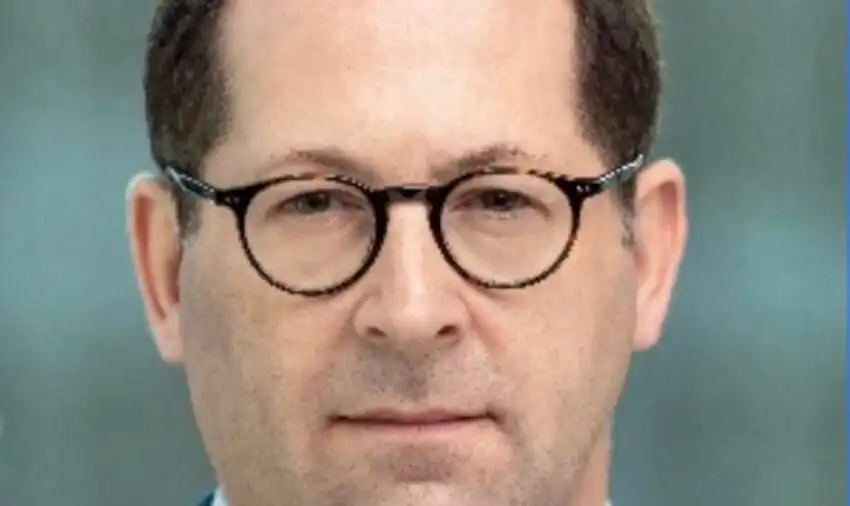Home>Michael Strauss: “Take the risks when they present themselves.”
11.12.2020
Michael Strauss: “Take the risks when they present themselves.”
Michael Strauss became the General Counsel at the European Bank for Reconstruction and Development at the beginning of 2020. He studied at Sciences Po in 1998 on an exchange program from the Fletcher School of Law & Diplomacy and found that his time at Sciences Po prepared him well for his career in many ways. The Sciences Po name, he has found, unlocked doors and served as “an important credential for a foreigner who wants to work in the French context.”
Strauss describes arriving at Sciences Po for an exchange semester, remembering being the only non-native Francophone in his class. “The best way to describe going directly into the third year, where the level is so high, was like grabbing hold of a freight train moving at full speed.” Despite initial challenges, Strauss found Sciences Po to be an incredible learning experience, “even just in terms of understanding the French system and understanding what was expected in the structure of argument in a French paper.” He also made many good, life-long friends.
After finishing his exchange at Sciences Po, Strauss completed his joint degree between The Fletcher School and Stanford Law School. After graduation, he began working in the London offices of a New York law firm. “I quickly started getting asked to work on French deals because I could work in French. After three years of that in London, I was eventually asked to move to my firm’s Paris office,” Strauss says. With an interest in moving into development finance, Strauss left the firm to join the legal department of the International Monetary Fund, and then moved to the World Bank. After President Obama’s victory, he moved over to the Obama Treasury Department to work on international macroeconomic policy, focused again on the IMF.
From there, the Administration sent Strauss to Manila to represent the United States on the Board of the Asian Development Bank, a role he describes as a dream role, bringing together economics, development, law, and diplomacy, and all towards the great honor of representing his country. “I was the deputy on the Board, but not long after I started, the ambassador retired, so I ended up acting in that role for quite a while there.” Before his current position at the EBRD, Strauss made another career move, joining a law firm as an equity partner focusing mainly on the legal work at international organizations, and on the needs of French businesses in Washington.
Strauss describes his current work at the EBRD as “the natural next career step and an exciting opportunity.” He enjoys managing an “incredibly high caliber legal team” and participating in the full spectrum of legal work at the EBRD. “I'm learning a lot about the areas of our work where I had less experience, such as human resources processes at an international organization and corporate recovery operations–restructuring deals that face problems. All towards the goals of development and transition in our countries of operations.”
The EBRD has played an important role addressing the effects of the Covid-19 pandemic in its countries of operations. Strauss describes a particular aspect of EBRD’s legal contribution, the EBRD’s Legal Transition Program, a team of specialist lawyers who provide technical assistance to help member countries improve their legal systems and establish best practices. Digitalization, he says, was already something the bank was working on but that has now rapidly accelerated. “The crisis presents an opportunity to do in a few days what would have taken years and years before,” he adds. The bank is also very focused on the key needs of clients, working capital and liquidity, to help them through the crisis. Strauss sees more complex issues to navigate related to moratoria on debt repayments during the crisis. “Obviously,” he says, “that is deeply connected with the legal function, and we work very closely with member countries, the G7 and the G20 around calls to address countries’ debt burdens.”
One positive change Strauss hopes to see is the move toward more sustainable investing. “We were already all moving strongly towards expanding green investments, and I think the current crisis underlines both the need and the opportunities available.” He notes that some banks are investing heavily in health and safety infrastructure, too, because during a public health crisis “these can form a key part of the infrastructure and public health,” he says. There is an active discussion underway about whether this is a specialization that makes sense for the EBRD to pursue during the crisis.
Asked his advice for current Sciences Po students and young graduates, Strauss recalls a response to the same question when he met with former General Counsel of the World Bank, Anne-Marie Leroy. She gave two pieces of advice, he remembers. “The first is that our careers are not linear. You can find yourself not doing what is right for you because you are not willing to make changes and follow alternative paths.” Second, he adds, “So many times in your career, you will face a choice that entails taking a calculated risk. Often, people are not willing to take those risks for the sake of comfort, financial reasons, or stability. For me,” Strauss says, “the best opportunities came when I was willing to take those risks when they presented themselves.” He reiterates, “Take the risks when they present themselves.”
